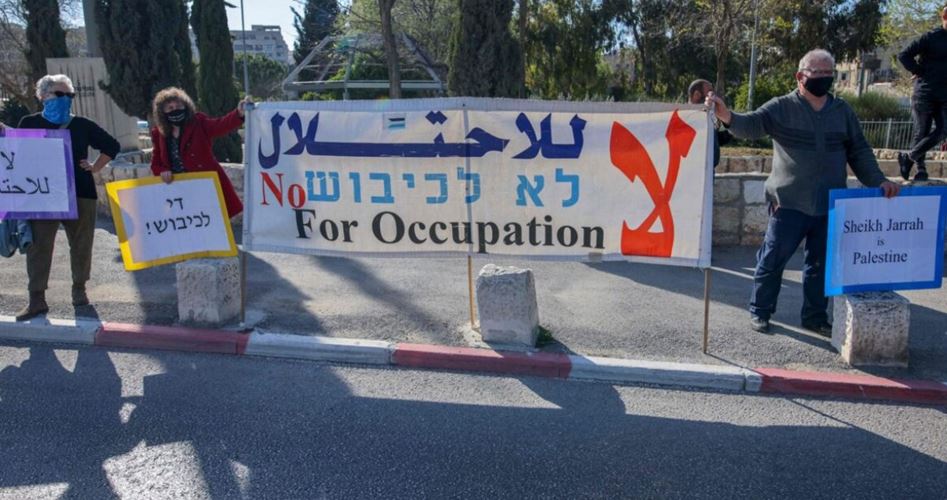Sheikh Jarrah residents want their voice to reach the world

By Motasem Dalloul
In February, an Israeli District Court in Jerusalem rejected an appeal filed by the families of the Karm Al Ja'ouni area of Sheikh Jarrah in occupied Jerusalem against a previous court ruling to freeze implementing eviction orders. The court gave four of the families – Skafi, Al Ja'ouni, Al Kurd and Al Qasim – until 2 May 2021 to leave their homes.
These are four families out of over 70 living in the area that are undergoing a fierce legal battle in Israeli courts to stop their forcible transfer to make room for illegal Israeli settlers to take over their homes and properties. The four families comprise 30 people in seven households.
Before the Nakba in 1948 these families lived in West Jerusalem, Jaffa and other areas in historic Palestine, then they became refugees. In 1953, UNRWA and Jordan, which ruled the West Bank including Jerusalem before the Israeli occupation, signed an agreement to carry out a residential project for 28 refugee families in the Al Ja'ouni area of Sheikh Jarrah and made a condition for them that they had to give up their ration cards issued by UNRWA in return for becoming official owners of the land within three years.
"Until 1967, Jordan did not issue ownership documents for the families," Mohammad Sabbagh, 75, from Sheikh Jarrah said. "Israeli occupied East Jerusalem, including Sheikh Jarrah in 1967, and Jordan, [abandoned] us," he said. "In 1972, we were surprised that Israeli settler groups claimed ownership of the land of Sheikh Jarrah and started legal procedures against four families, aiming to evacuate them and take over their homes. The legal battle continued until 2008 when they could evict four families."
Sabbagh, who is originally from Jaffa, continued: "On 3 January 2019, I received the first eviction order and through a complicated legal process we could have it frozen until 3 November 2020 when the Israeli District Court of Jerusalem refused to renew freezing the eviction order. Since then, we have been living the nightmare of second forcible displacement."
Nabil al Kurd, 77, told MEMO about his "second Nakba" which happened in 2009: "Prior to evicting me from my house, they proposed to purchase it for $10 million," he said, noting that such an offer was made to most of the Sheikh Jarrah residents, but no one accepted it. "They evicted me and my family and replaced us with settlers."
Al Kurd said that the Israeli authorities evicted him from his house and did not allow a settler family to replace him, but planted gangs made up of settlers to harass the Palestinian residents and put more pressure on them in order to flee the area. "It is not a housing issue," he said, "but a political one, and their goal is segregating the area in order to make a connected settlement belt around Al Aqsa Mosque."
He reiterated that the Judaization of Sheikh Jarrah along with another area in occupied Jerusalem did not start during the tenure of former US President Donald Trump, "but since 1967 as the Israeli occupation took over the house of the Al Shanti family on 9 November 1967 as they were not at home during the Israeli war."
Meanwhile, Abdul-Fattah Iskafi, whose house is among the families who are being ordered to leave their homes, told MEMO: "Since 2020, the Israeli settler groups have been fighting through the Israeli courts to evict us. Along with the battles in the courts, there are daily attacks and aggression carried out by the Israeli settlers and when we file complaints against them to the Israeli police, they detain us."
Iskafi says that the settler groups claim that they owned the land in 1875, but they have no original documents, "but the families of Sheikh Jarrah sent a delegation to Turkey and brought documents that proved that the land was not owned by the Hijazi family, a Muslim Palestinian family."
Sabbagh, Al Kurd and Hijazi speculated over the role of Jordan and UNRWA who are the two signatories on the lease documents. They say that UNRWA has never shown any solidarity with them, and neither has Jordan. "We call for Jordan, which signed the lease documents with UNRWA, to help us," Al Kurd said, noting that "this is a Jordanian issue."
Jordan claims that it handed over all the documents related to the residential project of Sheikh Jarrah to the Palestinian Authority in order to see whether it would use it to defend the residents of Sheikh Jarrah or not. However, the Palestinian Ministry of Foreign Affairs claims that the documents are not originals and that the Israeli courts do not recognize them.
"We are speaking to the world hoping [that people will listen]," Sabbagh said. "We are orphans, and no one cares about us or about our crisis. We have the right to live here, but no one is willing to help us."
Meanwhile, Al Kurd said: "We agreed to coexist with settlers, but it is not an issue of coexistence, it is a displacement and a colonization issue. They want to displace us and bring [settlers] to live in our homes."
Iskafi said: "We will remain here. We will not move anywhere. If they push us from our homes, we will stay in the streets. We have nowhere to go. We cannot leave these homes except if we turn back to our homes we were deported from in 1948."
Sheikh Jarrah is an open wound which was inflicted in 1948 and is bleeding until now. What is adding insult to injury is the continuous Israeli Judaization of the area amidst an almost complete official Arab, Islamic and international silence. Sheikh Jarrah is a carbon copy of other Palestinian neighborhoods, villages towns and cities across occupied Palestine.
Source: The Palestinian Information Center

WRITE YOUR COMMENT